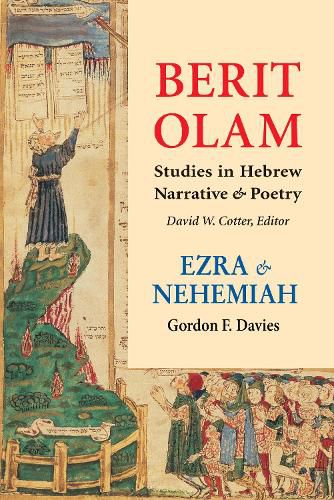Berit Olam: Ezra and Nehemiah
Gordon F Davies

Berit Olam: Ezra and Nehemiah
Gordon F Davies
This title is printed to order. This book may have been self-published. If so, we cannot guarantee the quality of the content. In the main most books will have gone through the editing process however some may not. We therefore suggest that you be aware of this before ordering this book. If in doubt check either the author or publisher’s details as we are unable to accept any returns unless they are faulty. Please contact us if you have any questions.
Ezra-Nehemiah has been neglected in biblical studies, but it is important as one of the few windows into the Persian period of Israel’s history, the setting for so much of the final shape of the Hebrew Bible. To know this period is to know what influenced these redactors. In Ezra and Nehemiah Gordon Davies provides that knowledge using rhetorical criticism, a methodology that reveals the full range and progress of the book’s ideas without hiding its rough seams and untidy edges.
The purpose of rhetorical criticism is to explain not the source but the power of the text as a unitary message. This approach does not look at plot development, characterization, or other elements whose roughness makes Ezra-Nehemiah frustrating to read. Instead, it examines the three parts of the relationship - the strategies, the situations, and the effects - between the speaker and the audience. Rhetorical criticism’s scrutiny of the audience in context favors the search for the ideas and structures that are indigenous to the culture of the text.
Rhetorical criticism is interested in figures of speech as means of persuasion. Therefore, to apply it to Ezra-Nehemiah, Davies concentrates on the public discourse - the orations, letters, and prayers - throughout its text. In each chapter he follows a procedure that: (1) where it is unclear, identifies the rhetorical unit in which the discourse is set; (2) identifies the audiences of the discourse and the rhetorical situation; (3) studies the arrangement of the material; (4) studies the effect on the various audiences; (5) reviews the passage as a whole and judges its success. In the conclusion, Davies explains that Ezra-Nehemiah makes theological sense on its own terms, by forming a single work in which a range of ideas is argued.
Biblical scholars as well as those interested in literary criticism, communication studies, rhetorical studies, ecclesiology, and homiletics will find Ezra and Nehemiah enlightening.
Chapters are Ezra 1:1-6,
Ezra 4:1-24,
Ezra 5:1-6: 15,
Ezra 7,
Ezra 9-10,
Nehemiah 1- 2,
Nehemiah 3-7, and Nehemiah 8-10.
Gordon F. Davies is associate professor of Old Testament and dean of students at St. Augustine’s Seminary of Toronto.
This item is not currently in-stock. It can be ordered online and is expected to ship in 7-14 days
Our stock data is updated periodically, and availability may change throughout the day for in-demand items. Please call the relevant shop for the most current stock information. Prices are subject to change without notice.
Sign in or become a Readings Member to add this title to a wishlist.

